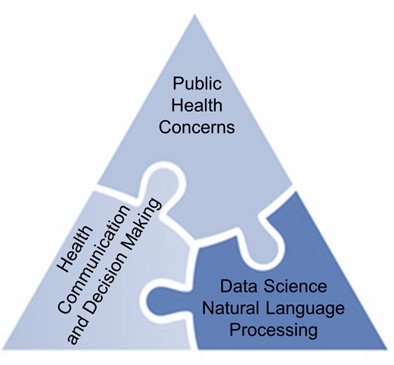Research in the Fridman Lab
Dr. Fridman’s professional objective centers on enhancing patient-provider health communication and medical decision-making, with a specific focus on digital health communications and misinformation. Employing theory-grounded approaches, and quantitative and qualitative research methods, including natural language processing and data science, she seeks to uncover the potential of contemporary digital health communications in improving health communications and thereby patient care.
Dr. Fridman’s expertise in health communication and behavioral theory originates from her graduate work, in which she applied principles of information framing theory to address the issue of overtreatment in patients with advanced cancer. To optimize consultations for patients with advanced cancer at Memorial Sloan Kettering Cancer Center, she proposed a revision of the information framing theory and developed a novel framework for approaching conversations that patients might find frightening or unpleasant. Collaborating with a team of physicians and behavioral scientists, she conducted a series of experiments using hypothetical scenarios involving volunteers and patients with cancer to test the effectiveness of the framework. Her work marked a novel application of information framing theory to solving practical issues that providers and patients face in palliative care. Her work gained recognition from theoretical experts and gained the Columbia Deming Cup (student) award as well as published in medical journals, including JAMA Oncology and the Journal of Pain and Symptom Management.
Dr. Fridman's postdoctoral experience provided her with the opportunity to participate in several large-scale projects, where she developed expertise in Natural Language Processing (NLP) and data science. Employing advanced techniques, including a dictionary approach and topic modeling from the NLP toolkit, she analyzed a large cohort of transcribed clinical encounters related to early-stage prostate cancer and patient decision-making. Her team identified systematic differences aligned with Prospect Theory, highlighting information delivery limitations in clinical settings. Her findings led to recommendations for enhancing preference-sensitive choice consultations and was recognized by experts in behavioral science and clinical professionals, resulting in presentations at the Society of Personality and Social Psychology conference and the Society of Medical Decision Making, along with a publication in a multidisciplinary Journal of Behavioral Medicine.
During her T32 fellowship at the Lineberger Comprehensive Cancer Center, Dr. Fridman delved deeply into research on digital health communication. During this period, she observed that patients face a significant challenge—an exponential increase in publicly accessible, yet often low-quality, health information. To assist patients with medical decision-making in a new era of digital health information, she obtained a pilot grant and conducted a structured review of studies that applied natural language algorithms for identifying misinformation. This work yielded concrete recommendations for patients and health information users providing them with guidance to discern health misinformation in the digital landscape. In parallel, she investigated patient-provider communications related to misinformation. In a series of experiments, she proposed and tested strategies for physicians to help them address misinformation during clinical encounters.
Committed to transforming research findings into tangible, actionable solutions that bolster public health initiatives, she secured a Career Award (K-22) from the National Cancer Institute. A 3-year project will result in a multilevel intervention to support patient-provider communications about cancer misinformation related to complementary and alternative therapy. Rooted in the Theory of Planned Behavior, this intervention comprises a question prompt list for patients and a specialized workshop for physicians. These tools are geared towards empowering healthcare professionals with effective conversation strategies. By fostering open discussions about cancer misinformation, this project aims to encourage information exchange and facilitate trust in patient-provider relationships as well as patients informed decisions that are consistent with scientific evidence.

Selected Publications
Fridman I, Johnson S, Elston Lafata J. Health Information and Misinformation: A Framework to Guide Research and Practice. JMIR Med Educ. 2023 Jun 7;9:e38687. doi: 10.2196/38687. PMID: 37285192; PMCID: PMC10285617.
Fridman I, Smalls A, Fleming P, Elston Lafata J. Preferences for Electronic Modes of Communication Among Older Primary Care Patients: Cross-sectional Survey. JMIR Form Res. 2023 May 24;7:e40709. doi: 10.2196/40709. PMID: 37223979; PMCID: PMC10248769.
Fridman I, Lucas N, Henke D, Zigler CK. Association Between Public Knowledge About COVID-19, Trust in Information Sources, and Adherence to Social Distancing: Cross-Sectional Survey. JMIR Public Health Surveill. 2020 Sep 15;6(3):e22060. doi: 10.2196/22060. PMID: 32930670; PMCID: PMC7511226.
Fridman I, Epstein AS, Higgins ET. Appropriate Use of Psychology in Patient-Physician Communication: Influencing Wisely. JAMA Oncol. 2015 Sep;1(6):725-6. doi: 10.1001/jamaoncol.2015.0980. PMID: 26181519.
Langford AT, Fridman I. Health communication and decisions: theory to practice. Health Communication and Decisions: Theory to Practice, Query date: 2024-06-01 07: 26. 2022 May 30;17.
Ilona Fridman, Cambray Smith, Amy Barrett,Skyler Johnson, Amrita Bhowmick, Ed, Sara Hayes, Jennifer Elston Lafata. Navigating Disagreements on Health Information: How Patients With Cancer Perceive Health Care Providers’ Approaches to Discussing Patient-Identified Information. JCO Oncology Practice. In Press January 2025.
